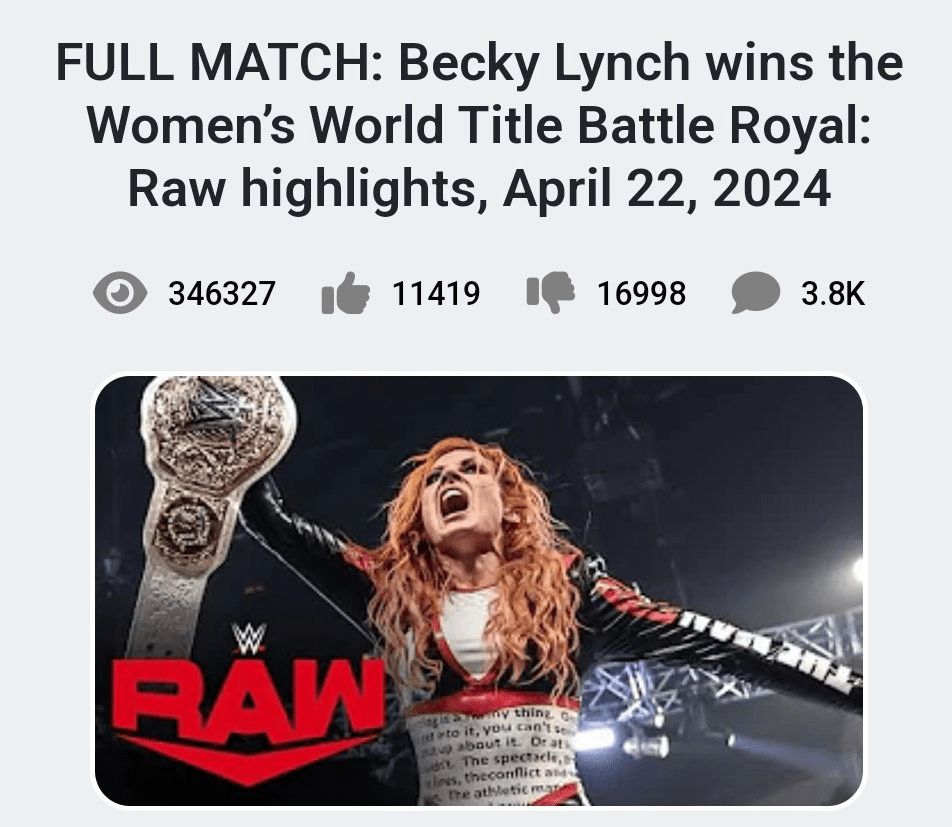The WWE Women’s division witnessed a seismic shift during the latest episode of Monday Night RAW, which saw Becky Lynch clinch the WWE Women’s World Championship in a highly contested battle royal. This match, held on April 22, was necessitated by the unfortunate injury of former champion Rhea Ripley, who suffered a shoulder injury reportedly at the hands of Liv Morgan, leading her to vacate the title.
The vacuum left by Ripley’s departure set the stage for a dramatic showdown among WWE’s top female superstars, with Becky Lynch emerging victorious after last eliminating crowd favorite Liv Morgan. This win marked Lynch’s seventh stint as a WWE Women’s champion, a moment she hoped would inspire her daughter and fans alike by showcasing her resilience and determination.
However, the response to Lynch’s victory has been anything but celebratory among the WWE fanbase. Video footage of the match’s conclusion on WWE’s YouTube channel has accumulated an unusually high number of dislikes compared to likes, signaling a wave of dissatisfaction from viewers. The discontent centers around the perception that Lynch, already a well-decorated champion, was given yet another title run at the expense of Liv Morgan, who many fans felt was more deserving of the spotlight due to her recent momentum within the division.

This backlash is not just a matter of unfavorable digital reactions; it represents a broader critique of WWE’s creative decisions. Fans have voiced their opinions loudly online, questioning the direction of the Women’s division and expressing frustration over the perceived repetitive nature of championship outcomes favoring established stars at the cost of emerging talent.
As WWE navigates this turbulent fan response, the implications for Becky Lynch’s championship reign are significant. Historically, WWE has shown a willingness to adjust storylines based on fan feedback, and the current climate may prompt creative shifts to realign with audience expectations. The challenge lies in balancing the allure and star power of established athletes like Lynch with the growing demand for new champions who can bring fresh dynamics to the women’s roster.
The decision to push Lynch as a champion again raises questions about WWE’s long-term planning for its female superstars and whether fan feedback will steer future booking decisions. It’s a delicate dance between maintaining narrative continuity and adapting to the evolving landscape of fan engagement and preferences.
Moving forward, WWE must address this disconnect with its fanbase, possibly by reevaluating how champions are chosen and ensuring that rising stars like Liv Morgan are not sidelined. The coming weeks will be critical in determining the trajectory of Becky Lynch’s reign and whether WWE can successfully quell the unrest and turn this controversy into a compelling narrative that wins back fan support.
As the fallout continues, the sports entertainment community will be watching closely. Can WWE turn this backlash into a constructive dialogue about the future of its Women’s division, or will fan dissatisfaction lead to more profound changes in how champions are crowned?




